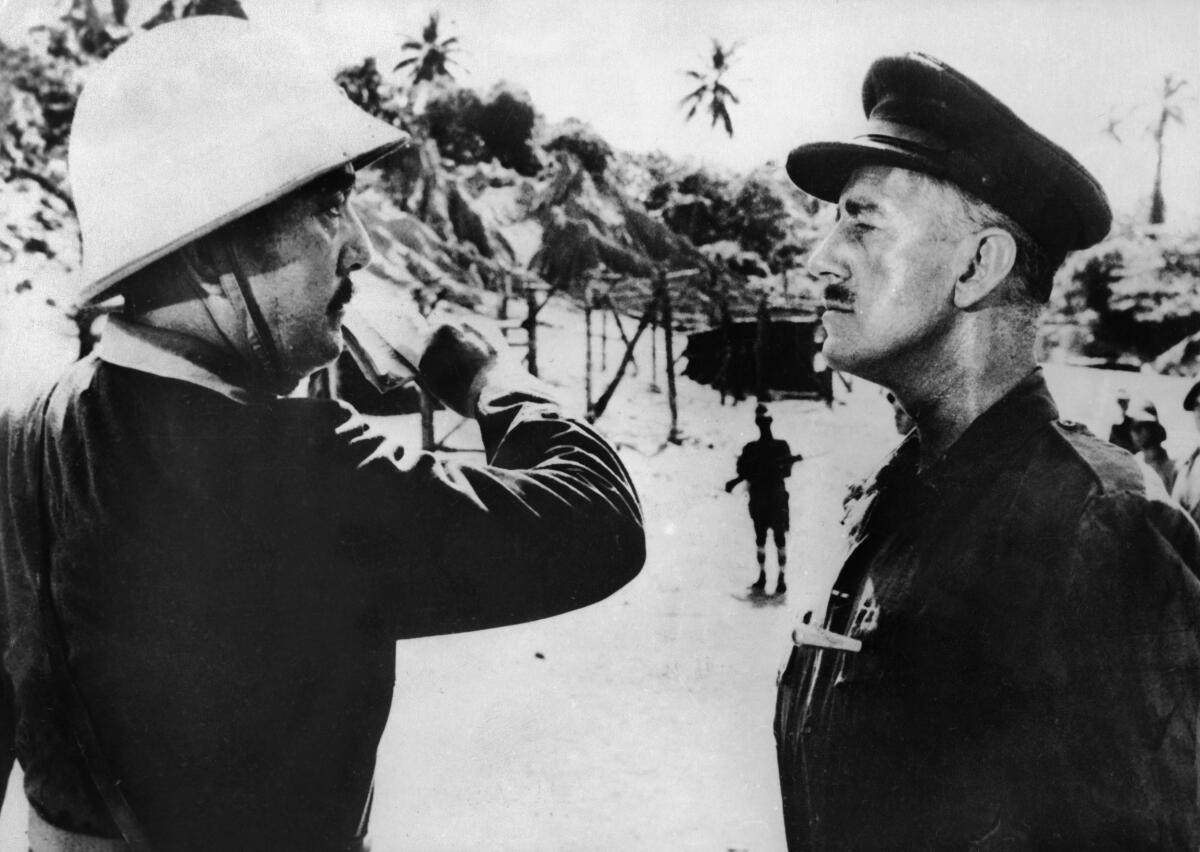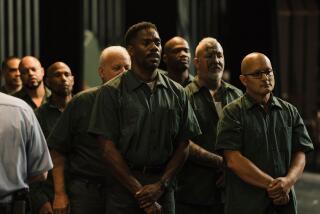From the Archives: ‘Bridge on the River Kwai’ spans war’s extremes

- Share via
When you see “The Bridge on the River Kwai” — and see it you surely will — you may be reminded, as I was for the first time in too long, that the potential of the cinema is practically limitless. It is a motion picture — and what is even rarer, one that actually gains by the use of wide screen and color.
“The Bridge on the River Kwai” is an Anglo-American creation, though more Anglo than American. It was produced by “On the Waterfont’s” Sam Spiegel and bills William Holden above his co-stars, Alec Guinness and Jack Hawkins, but its primary power lies in the direction by England’s David Lean and the acting of Guinness as a typical Indian army colonel of the old Kipling school.
Japan’s indestructible Sessue Hayakawa is not far behind him as the commander, equally inflexible, of a jungle prison camp in World War II.
Lean’s brilliant realization of the novel and screenplay by Pierre Boulle may well become the stiff-upper-lip classic of its time, like “Beau Geste” before it. It was photographed in Ceylon (by Britain’s ace, Jack Hildyard) amid natural scenery of unearthly beauty, making greater the ironic contrast between it and the tragedy of men bogged down in a war stalemate.
Not bogged down entirely, though. Beaten to his knees, cooked for days in an “oven” of corrugated iron and tin and subjected to every indignity the cruel Col. Saito (Hayakawa) can think up, Guinness, as his opposite Col. Nicholson, refuses to let his will break or even bend to the other’s.
Saito has ordered the British prisoners, officers included, to fall to and help build a railway bridge over the Kwai as the closing link in the Bangkok-to-Rangoon run. And May 12 is the date on which, by imperial Japanese edict, it must be completed.
It is over the use of officer personnel for menial labor that Guinness balks. Stubbornly, again and again, he reminds Hayakawa that this is expressly forbidden by the Geneva Conventions.
Then, gradually, a strange and subtle change takes place. The bridge being built is faulty, with a soft foundation, and work is all but disrupted.
Guinness, released from the oven, prevails upon the Japanese commander to let the British take over supervision of the job. His secret reason — and one apparently incomprehensible to the Oriental — is two-fold: to keep his men busy and thus disciplined and to prove that they, as prisoners, are better than their captors.
Positions Reversed
Before one’s eyes, now (and, somehow, without straining of the sense of logic) the positions of the two antagonists are reversed.
Guinness gives the orders; Hayakawa accedes. The film loses none of the sardonic humor of this situation, to which is added one even more sardonic: The building of the bridge becomes a fetish to Guinness and he enlists the labor of fellow officers, even wounded men, to get it done on time.
Up to this point, perhaps the ending of the first hour, the picture comes close to being a work of genius. It drops here as it leaves bridge and camp to detail the adventures of Holden, an American sailor who has escaped and somehow makes his way, though wounded, to a British hospital in Ceylon.
Holden repeats his goldbricking type of “Stalag 17”; the necessity, at any rate, to build up his prominence to star status is, in my opinion, the only excuse for the footage devoted to him and throws the story temporarily out of kilter.
However, it comes back strongly. Jack Hawkins, as a commando major, persuades Holden to lead him and a couple of picked men back to the prison camp so they may blow up the bridge ...
Cryptic Finish
It is my unshakable opinion that the film is flawed in one other respect: a sensational but exasperatingly cryptic finish. Certainly it is not the finish for which an audience has waited for well over two hours — to which, let us say, an audience is entitled. What almost surely should have been an act of renunciation by Guinness becomes — instead and ambiguously — an act of God.
Producer Spiegel’s explanation of this finish (slightly different, but none too clear, in the novel, either) is that he wanted to show “the futility of (all) war.” The impression I carried away was not one of futility but of chaos, which is not quite the same.
I have no other criticism of what is, on every other count, a truly fine film — and a bracing tonic for the loyal, if discouraged, film fan.
More to Read
Only good movies
Get the Indie Focus newsletter, Mark Olsen's weekly guide to the world of cinema.
You may occasionally receive promotional content from the Los Angeles Times.









